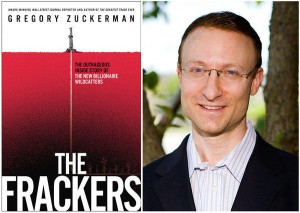Note: See Zuckerman discuss “The Frackers” on CSPAN2, August 18th at 9:15 to 11 pm. Coverage of “fracking” starts at 8:30 pm. [Dish Channel 211, DirecTV Channel 351].
>>>>>>>>>>>>>>>>>>>>>>>>>>>>>>>
“The Hardy Folks Who Found Gold in Shale”
From the Book Review by Dwight Garner, New York Times, November 5, 2013
Gregory Zuckerman, in his new book “The Frackers,” plants a not-so-cozy image in your mind. He compares hydraulic fracturing, the shooting of pressurized liquid into shale to release oil or gas deposits, to “giving the earth a massive enema.”
Fracking is an ecological nightmare, environmentalists contend, largely because of the chemical brew that drillers employ in the injection of that earth-enema. Groundwater has been contaminated; cows have died; humans may well be at risk. The issue has become politicized. Celebrity opponents have emerged.
The Rolling Stones, for example, considered all sides of the hydraulic fracturing issue in their 2012 song “Doom and Gloom” and reported: “Kind of makes your head explode/Feeling kind of hurt/Yeah.”
Don’t come to Mr. Zuckerman’s book in search of environmental exposé. Mr. Zuckerman, a writer for The Wall Street Journal, arrives instead to celebrate the wildcat frackers who have brought us, he writes, “the biggest phenomenon to hit the business world since the housing and technology booms.”
As recently as 2006, he reminds us, the apocalyptic notion of “peak oil” — the terminal decline of world petroleum supplies — was in the air. America in particular was nearly tapped out, forced to dally with (or topple) fickle Middle Eastern governments.
Alongside advances in horizontal drilling, fracking has rewritten the old equations. We are, suddenly, up to our nipples in oil and natural gas. “Soon, the nation will begin exporting gas, an unimaginable possibility just a few years ago,” Mr. Zuckerman writes.
“The Frackers” offers adulatory profiles of a half-dozen or so men. These include Harold Hamm, among the richest men in the world, who came from poverty — he was the 13th and youngest child of Oklahoma sharecroppers. “He talked like a hick,” one of Mr. Hamm’s friends tells the author. “People thought he was a dumb country bumpkin.” That aggressive bumpkin, Forbes reported recently, is now worth some $11 billion.
If there is any joy to be had in reading about the triumphs of these men (and they are all men), it comes from watching them stick it to the energy world’s complacent established players.
Companies like ExxonMobil had long dismissed fracking, considering it expensive and impractical, and have been forced to play catch-up. Mr. Zuckerman relishes the fact that ExxonMobil’s corporate headquarters, nicknamed the Death Star, squats directly over a large shale formation the company had ignored.
How good does nonfiction writing have to be? It’s a complicated question; there are so many variables. One answer, though, is: better than this. Isn’t there cliché-isolating software publishers can put to use? If not, why not? We need an app for this.
Second-rate writing and second-rate thinking tend to arrive in tandem, like the Captain & Tennille. “The Frackers” has little of nuance to say about geology or engineering. You will not come away with a more sophisticated notion of how hydraulic fracturing or horizontal drilling works.
Close examination of fracking’s environmental issues is abjured as well. Mr. Zuckerman raises these issues only briefly, and only to dismiss them by scampering safely up the middle. “Many of the environmental threats can be addressed or are overstated,” he says. “But progress has been too slow, there have been damaging missteps, and some say there’s too little regulation.”
Other recent books drive you along dirt roads this one will not. The science is vastly more rigorous in Tom Wilber’s “Under the Surface: Fracking, Fortunes, and the Fate of the Marcellus Shale” (2012). And “The End of Country: Dispatches From the Frack Zone” (2011), by Seamus McGraw, about natural gas extraction in northeastern Pennsylvania, is soulful and well reported.
“The Frackers” reminds you that books are a bit like promising oil or natural gas fields. As the Latin phrase has it, “Omnia bona quoad perfora.” All prospects look good until drilled.
See also: www.FrackCheckWV.net


{ 1 comment… read it below or add one }
Mr. Zuckerman seems to be among those who attribute intelligence to the wealthy, as though it was some kind of I. Q. test. Acquiring wealth has more to do with values than intelligence. A “go for it” attitude which subsumes all else is a major asset. Family, patriotism, any kind of community spirit.
Most wealthy do nothing original, simply find a good trick and repeat it over and over. The notion that wealth measures merit is a characteristic of the Calvinism strain that has been so strong in North Europe and the United States. In most times and places the wealthy have been seen in a different, clearer light.
In the case of the shale drilling evolution out of conventional oil and gas business it is something more like the old Tom Lehrer ditty, “The secret of success is plagiarize.”
You can hear the whole song about half way down the page here:
http://www.sing365.com/music/lyric.nsf/Lobachevsky-lyrics-Tom-Lehrer/D97B21BF6516390448256A7D0024B8B9
Lehrer was very popular when I went to college. He was a faculty member at MIT, Harvard and Wellesley and later the University of California at Santa Cruz, and had an outstanding career singing popular songs he wrote himself and accompanying himself. (He was also a writer for the American version of “That Was The Week That Was,” a news satire program on TV in 1964 and part of 1965.)